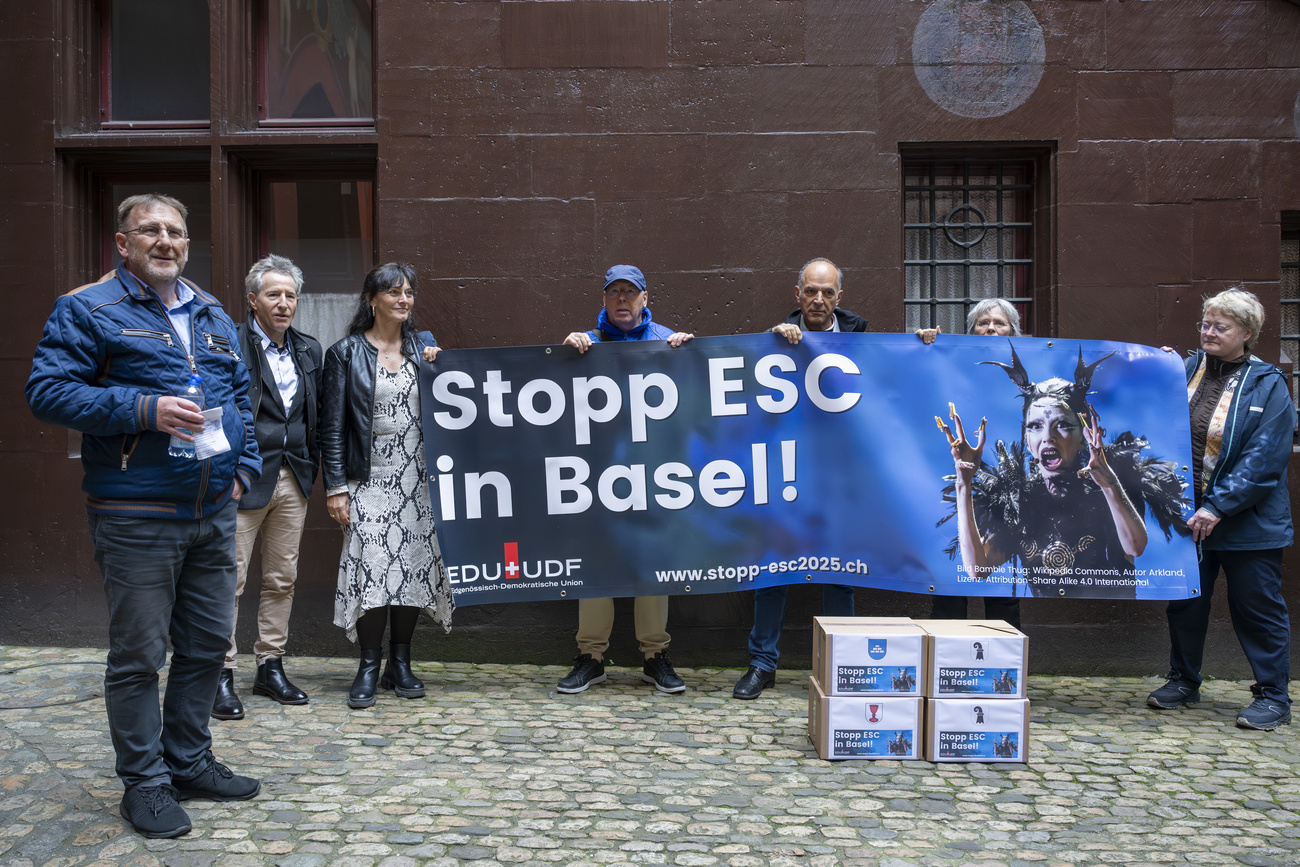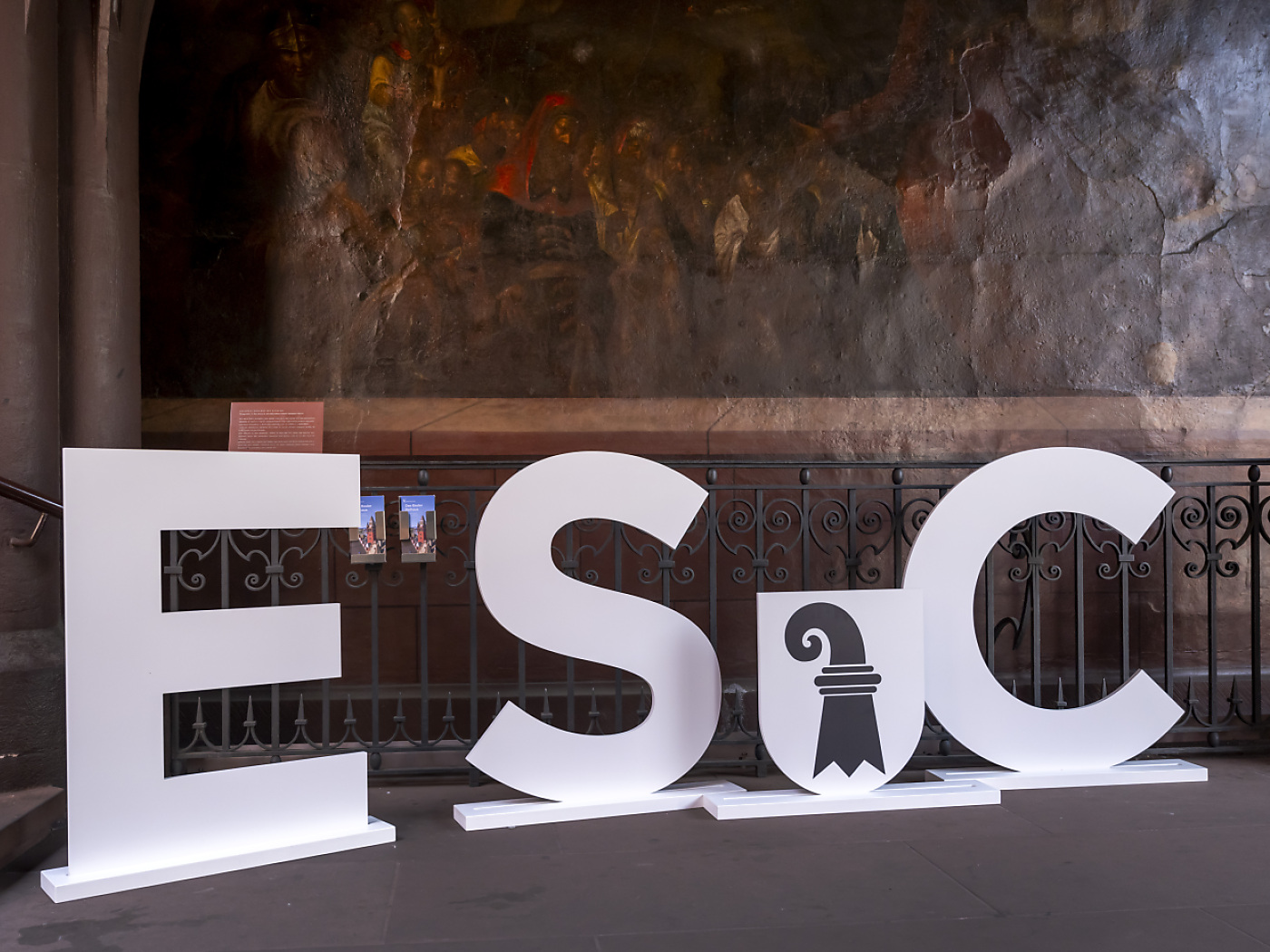How Irish pop star Bambie Thug became the face of a Swiss referendum on Eurovision

The Eurovision Song Contest will be coming to Basel. While choosing the host city was an incredibly slow process, a referendum to reverse the decision moved at double speed.
Barely two hours elapsed between the performance by Swiss contestant Nemo at the Eurovision finals in spring 2024 and the end of the jury and televote. And then it was clear to TV viewers that the world’s biggest music event would be held in Switzerland in 2025. There was great rejoicing in the winning country, and not only among Eurovision fans.
However, it was to take another six months – Switzerland is known for its frequent referendums – before the decision was finally confirmed. The people of Basel have now voted by a large majority in favour of hosting the contest. To be precise, 66,6% of voters in the canton of Basel City voted to confirm the canton’s public funding of nearly CHF35 million ($39.5 million) for Eurovision 2025.
If a majority had voted against, the funding would have been blocked. The Swiss Broadcasting Corporation – SWI swissinfo.ch’s parent company – could then have removed Basel from the running for hosting the event, according to research by the newspaper bz Basel. In the worst case, the European Broadcasting Union could have stepped in and relieved Switzerland of its right to host Eurovision 2025.

More
Swiss direct democracy is Eurovision’s latest challenge
Unlike Zurich, Bern and Geneva – which also bid to host the contest – the city of Basel is almost a canton in itself. Criticism of the event in Bern, for instance, would have been politically riskier. The population of rural canton of Bern, generally conservative, far exceeds that of the city of Bern. So even though voters in the federal capital are more left-wing and progressive than in Basel, a referendum against hosting Eurovision 2025 in Bern would have had a stronger chance of success.
Thus it is only now confirmed, in late November, that Eurovision 2025 will really be held in Basel. In comparison, the decision that Malmö would host the 2024 contest was already known in July 2023. The wheels of direct democracy turn slowly in Switzerland.
Speedy response
Behind the scenes, though, the referendum against the song contest required a real burst of speed for all involved. The Basel legislature approved the nearly CHF35 million for the event on September 11. “Basel, 12 points. Let us rejoice!” said Joël Thüring, president of the Basel finance committee and cantonal parliamentarian for the rightwing Swiss People’s Party, opening the debate. In the end, there were only four votes against. Basel’s politicians stood pretty unanimously behind the major event.

More
Swiss conservative party seeks referendum against Eurovision contest
But the referendum leaders were already in the starting blocks. They came from the Federal Democratic Union, Switzerland’s ultra-conservative Christian party. Members of this small party travelled from across the country to Basel City to collect the required 2,000 signatures from Basel residents. Just six weeks later, on October 28, they submitted around 4,200 signatures. And by November 4, voters in Basel had already received the ballot paper at home – including five pages of information and arguments on the Eurovision referendum. How was this possible in such a short time?
“The voting booklet and the ballot papers were printed in two different versions before October 26 – one with the Eurovision question and one without,” explained Basel government spokesperson Marco Greiner, when questioned by SWI swissinfo.ch. The citizens of Basel were also voting on other cantonal issues on November 24.
‘Image promotion’ or ‘image loss’?
So that explains how both sides managed to present their arguments in the voting booklet despite the tight deadline. The Basel government argued in favour of holding the event because of its “great added value” and the “international attention and image promotion” it would generate for the city. It also spoke of a “festival of tolerance for the entire population”, referring to the side events that would take place around the city.
Meanwhile, the opponents’ arguments in the voting booklet read almost like a mirror image. They spoke of a “waste of money” and warned that the event would result in a “loss of image” for Basel – referring to the anti-Israel protests in Malmö and the behaviour of other Eurovision delegations towards Israeli singer Eden Golan. “We do not want to provide a forum for a Eurovision Song Contest that does not do enough to prevent such anti-Semitic excesses.”
‘Occult and satanic performances’
Above all, however, the opponents see Eurovision as a playing field in the battle between heaven and hell. They decry “unfair double standards”. Around ten years ago, a band from the Christian evangelical Salvation Army, representing Switzerland in the contest, was not allowed to participate under the name Salvation Army.
Whereas “occult and satanic performances (like the one by ‘Bambie Thug’) (…) are tolerated and even celebrated”. This, the referendum initiators say, is unfair.
Unlike the Salvation Army, however, Bambie Thug is a pop star, and – as far as is known – they do not represent an occult religious organisation.
Moreover, Bambie Thug’s song at Eurovision 2024 drew on wording from the fantasy world of Harry Potter. “Avada Kedavra, I speak to destroy”, sang the non-binary pop star, who was competing for Ireland. “Avada Kedavra” is the death curse in the highly popular novel and film series. But, seeing as Bambie Thug’s face was splashed across campaign posters on trams and buses in Basel, it can be assumed that this is what bothered the instigators of the referendum most – more than the canton’s finances (Basel City regularly generates budget surpluses).
National influence on local politics?
Although the signature collection sheets for the referendum stated that they should be handed in to the Federal Democratic Union branch in Basel City, it was the party’s national representatives who always appeared in public – in particular the president, Samuel Kullmann from the Bernese Oberland. Overall, the party made no bones about the fact that the Basel City vote was mainly driven by activists from other parts of the country.
Marc Bühlmann is the director of the “Année Politique Suisse” platform and a professor of political science at the University of Bern. When contacted, he said that he had no specific facts about how often local referendums are instigated by people from outside. But he “could imagine that this is not so rare.”
Indeed, according to the political scientist, it is not unusual for matters of countrywide interest to be put to the vote locally. National issues – such as a minimum wage or transparency in political funding – are often “tested” in cantons. The process is often coordinated by nationally organised parties via their cantonal sections.
This is not a problem for democracy though, Bühlmann argues. In the case at hand, all the signatures came from Basel residents. “So it is very much the population of the canton that initiated the vote. And this is the only factor that determines whether an issue is put to the vote or not.” You may regard it as a good or a bad thing if the driving force behind a vote comes from the outside, he adds, depending on your view on democratic theory.
From the “perspective of participatory democratic theory”, the political scientist concludes, there can never be enough votes and debates on a given topic. Arguably, then, it is only to be welcomed “if stakeholders from outside the canton see to this.”
It is unclear whether Bambie Thug and their fans in Ireland and across Europe know that the pop star has become the face of a religiously motivated political campaign. But in any case, the majority of Basel residents were not won over by these arguments.
Edited by Giannis Mavris. Adapted from German by Julia Bassam/ac.

More
Our democracy newsletter

In compliance with the JTI standards
More: SWI swissinfo.ch certified by the Journalism Trust Initiative








You can find an overview of ongoing debates with our journalists here . Please join us!
If you want to start a conversation about a topic raised in this article or want to report factual errors, email us at english@swissinfo.ch.